#Cornelius Meister
Explore tagged Tumblr posts
Text
Staatsoper Stuttgart - Parsifal (Wiederaufnahme)
Foto ©Martin Sigmund Die Staatsoper Stuttgart führt derzeit die umstrittene Produktion von Parsifal erneut auf, die 2010 von Calixto Bieito inszeniert und anschließend 2013 und 2018 wiederaufgeführt wurde. Continue reading Staatsoper Stuttgart – Parsifal (Wiederaufnahme)

View On WordPress
#calixto bieito#canto#cornelius meister#critica#david steffens#opera#parsifal#pawel konik#rosie aldridge#samuel sakker#shigeo ishino#staatsoper stuttgart#staatsopernchor stuttgart#staatsorchester stuttgart#stuttgart#teatro#wagner
0 notes
Text
ARIADNE AUF NAXOS A LA STAATSOPER DE VIENA (Davidsen-Spyres-Lindsey-Blanch; Meister-Bechtolf)
Kate Lindsey (compositor) i Sra Blanch (Zerbinetta) a Ariadne auf Naxos a Viena 2025 © Wiener Staatsoper | Michael Pöhn Lise Davidsen com a Ariadne a la Ariadne auf Naxos a Viena 2025 © Wiener Staatsoper | Michael Pöhn Michael Spyres Bacchus a Ariadne auf Naxos a Viena 2025© Wiener Staatsoper | Michael Pöhn Anna Netrebko havia de debutar en el rol d’Ariadne a la Staatsoper de Viena a finals de…
#Adrian Eröd#Andrea Giovannini#Ariadne auf Naxos#Bernhard Schir#Cornelius Meister#Daniel Jenz#Daria Sushkova#Florina Illie#Hugo von Hofmannsthal#Ileana Tonca#Jusung Gabriel Park#Kate Lindsey#Lise Davidsen#Markus Pelz#Michael Spyres#Oleg Zalytskiy#Orquestra de la Staatsoper Viena#Richard Strauss#Sara Blanch#Simonas Strazdas#Sven-Eric Bechtolf#Thomas Ebenstein#Wolfram Igor Derntl
0 notes
Text

In der Oper steht es auch nicht zum Besten. Gemetzel, Blutrausch, Rachegelüste allenthalben, und der Countdown läuft unerbittlich. Es ist die 30. Aufführung einer neunzehn Jahre alten Inszenierung, so daß ich wohlmeinend annehme, daß einiger dererer subtileren schauspielerischen Ansätze in Vergessenheit geraten sind, während der Tobi quengelt: "Schade, dabei hätte das solches Potential gehabt." Elektra (mitte) singt auch nicht besonders schön, man weiß nicht, ob das wegen der Rachegelüste ist, die sie plagen, oder ob sie es nicht besser kann.
#Elektra#Iréne Theorin#Violeta Urmana#Peer Oscar Musinowski#Simone Schneider#Paweł Konik#In der Oper gewesen#Peter Konwitschny#Oper#Richard Strauss#Hugo von Hofmannsthal#Cornelius Meister
0 notes
Note
Oh???? Another person with an AU and their own versions of the Rogues? Which ones you got because I want to know EVERYTHING about them.
OKAY SO I have a list of Rogues that are gonna be in my AU and the list is a bit Long, some of these character still need to be fully shaped, but Asking Question about them is probably gonna help, so feel free to ask about any of them (Also I'm trying to organise the whole thing)
Characters:
Leader of Crime Organizations and people attached to it:
The Penguin - Oswald Cobblepot
Flamingo - Edouardo Flamingo
Music Meister - Darius (Cobblepot) Chapel
Carmine "The Roman" Falcone (and his family)
Sal "The Boss" Maroni (and his family)
Black Mask
Talon and the Court of Owls
Ra's Al Ghul, Talia Al Ghul and the league of Assassin
Mother - Christian Cain
The Big Ones (Very Important to the General Plot):
Joker - ???
Harley Quinn - Harleen Quinzel
Riddler - Edward Nygma
Two Face - Harvey Dent / Harv'
Poison Ivy - Pamela Isley
The Scarecrow - Jonathan Crane
(AU OC) The Mania - Marlene McCree
(AU OC) The Mourning Dove - Bo Hawkins
Dr. Hugo Strange and Dr. Jeremiah Arkham
The Others (some Still important):
Catwoman - Selina Kyle
Magpie - Margaret Pye
(AU OC) Soda Can - Cheryl Lee (Later Cheryl Chapel Lee)
Punchline - Alexis Kaye
Jester - Duela Jones (Joker Daughter in comics)
Mad Hatter - Jervis Tetch
Victor Zsasz
(AU OC) Madame - Camilla Shelley
Jane Doe - ???
Professor Pyg - Lazlo Valentin
DollMaker+Dollhouse - Barton Mathis and Matilda Mathis
Mister Camera - Alexander Gillian
The Eraser - Leonardo Fiasco
Man-Bat - Dr. Kirk Langstrom
Killer Croc - Waylon Jones
Orca - Dr. Grace Balin
Bane - ???
Firefly - Garfield Lynns
Anarky - Lonnie Machin
Ratcatcher (s) - Otis Flanegan and Cleo Flanegan
Clayface - Basil Karlo
Calendar Girl - Paige Monroe
Roxy Rocket - Roxanne Sutton
Baby Doll - Mary Dahl
Cluemaster - Arthur Brown
Clock King - William Tockman
Calendar King - Julian Day
The Calculator - Noah Kuttler
Bookworm - A.S Scarlet
King Tut - William Yasser
Catman - Thomas Blake
Lord Death Man - Tetsuo Fujiwara
Kite Man - Charles "Chuck" Brown
Mister Bloom - ???
Solomon Grundy - Cyrus Gold
Ventriloquist - Arnold Wesker
Character that I want to add but need to do more research on them:
Professor Achilles Milo
White Rabbit - Jaina Hudson
The Carpenter - Jenna Duffy
Cornelius Stirk
Toymaker - Cosmo Krank
Crime Doctor - Bradform Thorne
D.A.V.E
The Designer - ???
Deadshot - Floyd Lawton
Doctor Phosphorus - Dr. Alexander Sartorius
Ten Eyed Man - Philip Reardon (The Spooky Version)
Spellbinder - Charles Dante
Lady Arkham - Victoria Arkham
Merrymaker - Dr. Byron Meredith
Onomatopoeia
Polka Dot Man - Abner Krill
Killer Moth - Drury Walker
(and Captain Boomerang if I am peer pressured enough)
17 notes
·
View notes
Text
Here's everything I read in 2024. I did not include anything outside of authors and titles. If anyone wants to talk about this list, feel free to do so.
January
1. Heiner Müller: Germania.
2. Roland Schimmelpfennig: Anthropolis. Ungeheuer. Stadt. Theben.
3. Werner Schwab: Offene Gruben Offene Fenster.
4. Werner Schwab: Hochschwab.
5. Boston Teran: God is a Bullet.
6. Stephen Konkolly: Black Flagged 2: Redux.
7. Eugene Ionesco: Die kahle Sängerin.
8. T.J. Payne: Intercepts.
9. Thomas Bernhard: Midland in Stilfs.
February
1. Thomas Bernhard: Ritter, Dene, Voß.
2. Thomas Bernhard: Frost.
3. T.J. Payne: In my Father's Basement.
4. Werner Schwab: Messaliance aber wir ficken uns prächtig.
5. William Gibson: Neuromancer.
6. Brian Evenson: Song for the Unraveling of the World.
7. Adam Nevill: Some will not Sleep.
8. Alex Michaelides: The Silent Patient.
March
1. Thomas Bernhard: Alte Meister
2. Thomas Bernhard: In der Höhe.
3. Hiron Ennes: Leech.
4. Thomas Bernhard: Holzfällen.
5. Jonathan Sims: Family Business.
6. Thomas Bernhard: Watten.
7. Jason Rekulak: Hidden Pictures.
8. Craig DiLouie: Episode 13.
9. J.G. Ballard: The Atrocity Exhibition.
10. J.G. Ballard: Crash.
April
1. Riley Sager: Home Before Dark.
2. Philip K. Dick: VALIS.
3. Philip K. Dick: The Divine Invasion.
4. Taylor Adams: No Exit.
5. Thomas Bernhard: Der deutsche Mittagstisch.
6. Grant Morrison: Doom Patrol.
7. John M. Ford: The Scholars of Night.
8. Laird Barron: The Imago Sequence.
May
1. Mick Herron: Real Tigers.
2. Mick Herron: Spook Street.
3. Mick Herron: London Rules.
4. Heiner Müller: Krieg ohne Schlacht.
5. Steve Kavanagh: Thirteen.
6. Ben Macintyre: A Spy among Friends.
7. James Swallow: Nomad.
8. Thomas Bernhard: Beton.
9. A.M. Shine: The Watchers.
June
1. Sammy Scott: BETA.
2. Theodor W. Adorno: Minima Moralia.
3. Chuck Palahniuk: Lullaby.
4. CJ Tudor: The Drift.
July
1. M.T. Edvardsson: The Woman Inside
2. Heiner Müller: Philoktet.
3. Bertolt Brecht: Furcht und Elend des 3. Reiches
4. Bertolt Brecht: Das Leben des Galilei.
5. F.X. Kroetz: Ich bin das Volk.
6. Darcy Coats: The Carrow Haunt.
7. Sammy Scott: At Home with the Horrors.
8. Kuno Raeber: Das Ei.
9. Kuno Raeber: Bocksweg.
10. Jason Arnapp: The Last Days of Jack Sparks.
11. Jason Arnapp: Ghoster.
12. Grabbe: Gothland.
August
1. Mark Haber: St Sebastian's Abyss.
2. Laird Barron: Occultation.
3. S.T. Edvardsson: A Nearly Normal Family.
4. Paul Tremblay: Horror Movie.
5. R. Scott Bakker: The Darkness that Comes Before.
6. Heinrich v. Kleist: Die Marquise von O....
September
1. Friedrich Dürrenmatt/Charlotte Kerr: Achterloo I/Rollenspiele/Achterloo IV.
2. R. Scott Bakker: The Warrior-Prophet.
3. Friedrich Dürrenmatt: Die Panne. Erzählung, Hörspiel, Komödie.
4. Friedrich Dürrenmatt: Der Mitmacher.
5. R. Scott Bakker: The Thousandfold Thought.
6. Christa Wolf: Kein Ort. Nirgends.
7. Simon Strantza: Burnt Black Suns.
8. Todd Keisling: Devil's Creek.
October
1. Willi Winkler: Die Geschichte der RAF.
2. Rolf Hochhuth: Der Stellvertreter.
3. Adam Neville: House of Small Shadows.
4. John Hornor Jacobs: The Sea Dreams it is the Sky.
5. Steven Konkoly: Black Flagged 3: Apex.
6. Werner Schwab: Fäkaliendramen (vier Stücke).
7. Steven Konkoly: Black Flagged 4: Vektor.
8. Mark Haber: St Sebastian's Abyss (re-read).
November
1. Steven Erikson: Gardens of the Moon.
2. Steven Erikson: Deadhouse Gates.
3. Gedichte von Celan + Hölderlin.
December
1. Peter Weiß: Hölderlin.
2. Steven Erikson: Memories of Ice.
3. Junji Ito: Uzumaki.
4. Cornelius Ryan: The Longest Day.
5. Paul Celan: Von der Dunkelheit des Dichterischen/Der Meridian.
6. Friedrich Nietzsche: Götzen-Dämmerung.
7. Hans-Peter Kunisch: Todtnauberg.
Honorable Mentions
(Books I read sizable chunks of and spent time with but didn't actually finish)
1. Adorno/Horkheimer: Dialektik der Aufklärung
2. Barbara Wiedemann: Die Goll-Affäre.
3. Elfriede Jelinek: Ulrike Maria Stuart.
4. Francesca Stavrakopoulou: God: An Anatomy.
5. Jon Fosse: Septology. (Vol.01 finished in December so I don't want to tag the whole novel).
0 notes
Text
GLOBAL GROOVE [F] » Luanda Baldijao » DIARIO TROPICAL » Música Gatuna » GateandoAmérica [F] » Veneno Sonidero (listens) » Selecta Smith | Douglas Noble (Tigerbalm) // Ness Radio » Mondaze Radio // Toto La Mamposina » Anacaona
Andrés Landeros (YT) » Archivo Sonido Dueñez [F] » Ritmos del cometa | Selección Mexicana Andrés Landeros (YT) » Sonido Superchango
Andrzej Krzaku Strycharczuk (F) Jempi Samyn> AFRICAN CARIBBEAN » Booggee>Cuba Si! AFRICAN CARIBBEAN » David Byrne Radio
Tropicaneando con Paola (F) Babaliah (F) Rootsprovisionah
Martiko cumbia [s] » Radio Martiko » PSYCHOPHONO [F] » borguez
Ecuadorian Rhythms / Ponchito de Colores with Quixosis // 24-05-20 » quixosis [s] » MOVIMIENTOS|Guest Mix #48: Da Iguana » Lascivio Bohemia [s] » EDMXT005/ Martin i - Cumbia All Stars Mixtape
W 60 minut dookoła świata, Conjunto Papa Upa > EBB Music
Sonido Gallo Negro, Son Rompe Pera, Cumbia, Bolero, Dengue Dengue Dengue, Silvana Estrada, Abelardo Carbono, Celso Piña, Villa Diamante, Chicha Libre, Ska Cubano, Los Cojolites, Son Jarocho, Perez Prado, Systema Solar, KoKoKo, Ibibio Sound Machine, Art Ensemble of Chicago, Ancient Infinity Orchestra, marjorie eliot's, Nana Benz du Togo, Os Originais do Samba, Los Pirañas, currulao, merecumbe, bolero, Andrés Landeros, nada el shazly, Carmen Prieto, Madame Vacile, Fruko, Sidestepper, meister lampe, Sofia Kourtesis, funtcase, manu chao, cornelius doctor, Mabe Fratti, Martina Camargo, Sonora Ponceña, Dred Scott Trío, La Sociedad 76, Yanti Bersuadara, Martin Denny, Lila Downs, Los Mirlos, DonQuichiote, Hermanos Gutiérrez, Arsenio Ramirez, Amadou, Farida Amadou, Mama Tora...
Lady Avocado [F] » El Frenético|Fiesta de Demonios>listen by Peterman70 » Sentimental Grooves by The Limonian
world music » rádio oxigénio » Radio Palenque Records[F] Roger Brockbank
guiro» julio inti » yuruba » mañana cuba
Panamá Cardoon, meridian brothers, sexteto, palenque, king chango
...WTF David Byrne
0 notes
Text
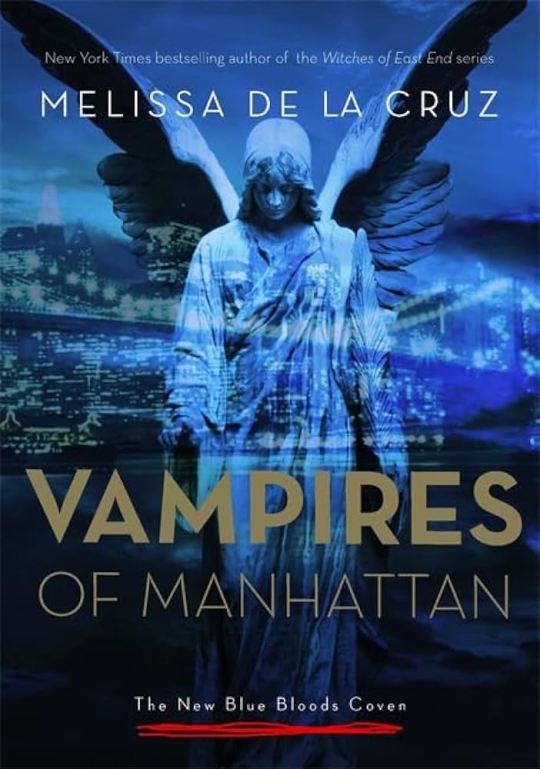
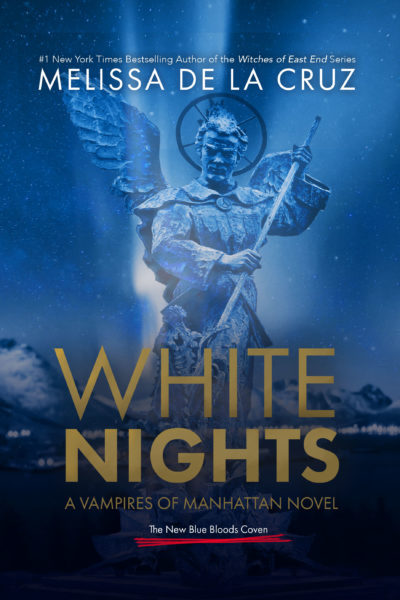

Antike (ca. 2000 vChr. bis ca. 500 nChr.)
Gilgamesch-Epos
Homer: Ilias, Odyssee
Äsop: Fabelsammlung
Caesar, Gaius Iulius: Der gallische Krieg
Vergil: Aeneis
Ovid: Metamorphosen
Tacitus, Publius Cornelius: Germania
Augustinus, Aurelius: Bekenntnisse
Herodot: Historien
Mittelalter (500-1500)
Beowulf
Murasaki Shikibu: Die Geschichte vom Prinzen Genji
1001 Nacht
Nibelungenlied
Gottfried von Straßburg: Tristan
Wolfram von Eschenbach: Parzival
Chaucer, Geoffrey: Die Canterbury-Erzählungen
Renaissance (1500-1600) und
Barock (1600-1720)
Boccaccio, Giovanni: Das Dekameron
Brant, Sebastian: Das Narrenschiff
Machiavelli, Niccolö: Der Fürst
More, Thomas: Utopia
Rabelais, Franois: Gargantua und Pantagruel
Cervantes Saavedra, Miguel de: Don Quijote
Grimmelshausen: Der Abentheurliche Simplicissimus Teutsch
Aufklärung (1720-1785)
Hobbes, Thomas: Leviathan
Fielding, Henry: Die Geschichte des Tom Jones, eines Findlings
Voltaire: Candide
Sterne, Laurence: Leben und Ansichten von Tristram Shandy, Gentleman
Rousseau, Jean-Jacques: Emile oder Über die Erziehung
Kant, Immanuel: Kritik der reinen Vernunft
Sturm und Drang (1765-1790)
Goethe, Johann Wolfgang von: Die Leiden des jungen Werthers
Bürger, Gottfried August: Münchhausen
Klassik (1786-1832)
Defoe, Daniel: Robinson Crusoe
Swift, Jonathan: Gullivers Reisen
Goethe, Johann Wolfgang von: Die Wahlverwandtschaften
Kleist, Heinrich von: Michael Kohlhaas
Romantik (1798-1835)
Arnim, Achim von/Brentano, Clemens: Des Knaben Wunderhorn
Grimm, Jacob und Wilhelm: Kinder- und Hausmärchen
Austen, Jane: Stolz undVorurteil
Eichendorff, Joseph Freiherr von: Aus dem Leben eines Taugenichts
Andersen, Hans Christian: Märchen
Gogol, Nikolai: Tote Seelen
Balzac, Honore de: Verlorene Illusionen, Glanz und Elend der Kurtisanen
Bronte, Charlotte: Jane Eyre
Bronte, Emily: Die Sturmhöhe
Huge, Victor: Die Elenden
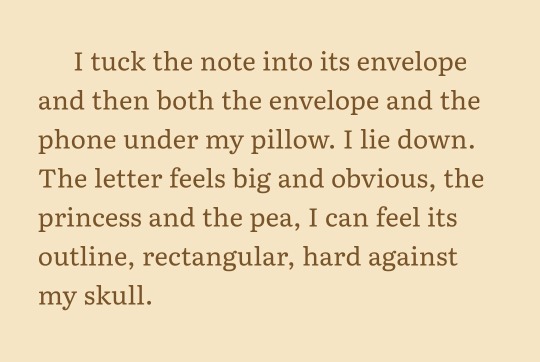
Biedermeier und Vormärz (1815-1848)
Heine, Heinrich: Buch der Lieder, Deutschland. Ein Wintermärchen
Büchner, Georg: Lenz
Droste-Hülshoff, Annette von: Die Judenbuche

Moderne (1850-1968)
Melville, Herman: Moby Dick
Beecher Stowe, Harriett: Onkel Toms Hütte
Keller, Gottfried: Dergrüne Heinrich
Dickens, Charles: Große Erwartungen
Dostojewski, Fjodor: Der Idiot
Tolstoi, Lew: Krieg und Frieden
Mark Twain: Tom Sawyers Abenteuer
Storm, Theodor: Der Schimmelreiter
Wilde, Oscar: Das Bildnis des Dorian Gray
Lagerlöf, Selma: Gösta Berling, Nils Holgersson
Fontane, Theodor: Effi Briest
Mann, Thomas: Buddenbrooks, Der Zauberberg
Proust, Marcel: Auf der Suche nach der verlorenen Zeit
Joyce, James: Ulysses
Babel, Isaak: Die Reiterarmee
Fitzgerald, Francis Scott: Der große Gatsby
Kafka, Franz: Der Prozess, Das Schloss
Woolf, Virginia: Mrs. Dalloway
Hesse, Hermann: Der Steppenwolf, Das Glasperlenspiel
Döblin, Alfred: Berlin Alexanderplatz
Remarque, Erich Maria: Im Westen nichts Neues
Roth, Joseph: Hiob, Radetzkymarsch
Traven, B.: Das Totenschiff
Fallada, Hans: Kleiner Mann - was nun?
Mann, Klaus: Mephisto
Steinbeck, John: Früchte des Zorns
Orwell, George: Farm der Tiere
Machfus, Nagib: Die Midaq-Gasse
Camus, Albert: Die Pest
Greene, Graham: Der dritte Mann
Dürrenmatt, Friedrich: Der Richter und sein Henker
Nabokov, Vladimir: Lolita
Tomasi di Lampedusa, Giuseppe: Der Leopard
Frisch, Max: Homo Faber
Aitmatow, Tschingis: Dshamilja
Grass, Günter: Die Blechtrommel
Solschenizyn, Alexander: Ein Tag im Leben des Iwan Denissowitsch
Wolf, Christa: Der geteilte Himmel
Bulgakow, Michail: Der Meister und Margarita
Garcia Märquez, Gabriel: Hundertjahre Einsamkeit
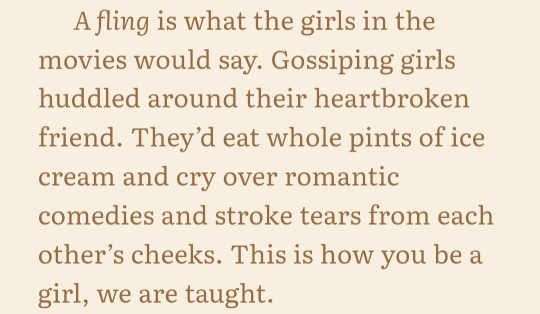
Gegenwart (ab 1968)
Lenz, Siegfried: Deutschstunde
Kertesz, Imre: Roman eines Schicksallosen
Eco, Umberto: Der Name der Rose
Jelinek, Elfriede: Die Klavierspielerin
Kundera, Milan: Die unerträgliche Leichtigkeit des Seins
Morrison, Toni: Menschenkind
Vargas Llosa, Mario: Das Fest des Ziegenbocks
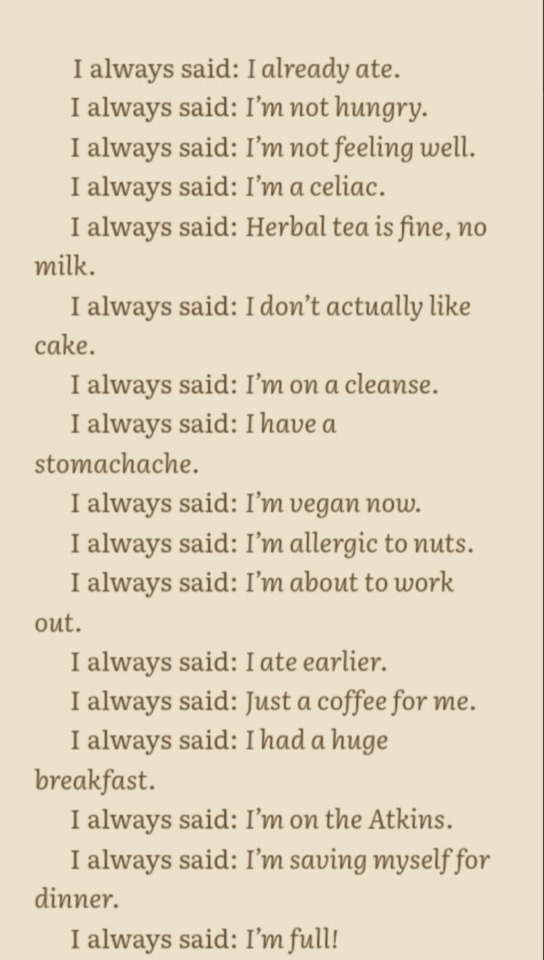
0 notes
Text
Anonymous asked: It’s so good to have you back posting. You mentioned seeing Wagner’s Ring Cycle at the Bayreuth Festival no less during your five month hiatus from your blog. How was that? I’m one of the lucky few to make a full time living as a musician in a symphony orchestra. I’m a Wagner fan as you are too and so I hope you could settle a question about Wagner. I’m sure you know how picky he was about the demands he made on his audiences. If Gustav Mahler contributed to the origination of the modern concert hall experience then did Richard Wagner really make the noisy audience shut up and be silent during opera performances on stage?
It’s easy to look at any stern looking portrait of Richard Wagner with his mutton chop whiskers and not think yes, this Teutonic cad is a killjoy (even if you can get past the lurid anti-semitism etc). But I fear for some things we do Wagner an injustice. Many bad things usually attributed to him are in reality unfair and even untrue. Things are so easily believed because it reinforces the nasty bad boy image we have of him.
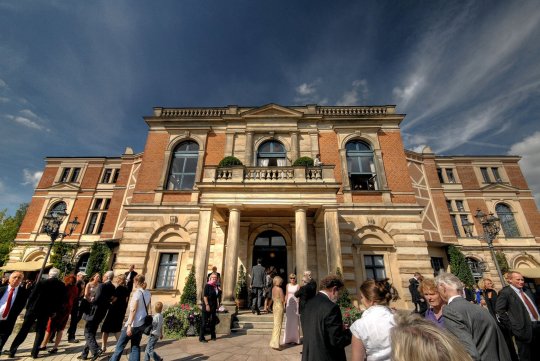
This past summer I did see Wagner’s Ring Cycle in Bayreuth, the shrine of all things Wagnerian. My French partner grumbled we were better off spending and extra week of vacation in Bali rather than waste a week on Wagner. As a strong Wagnerian, this was all sacrilege to my ears of course. But in hindsight I should have known better. Any opera staged at Bayreuth these days should be approached with fear and trembling. In short, I was better off listening to Wagner on my headphones whilst sipping cocktails on a beach in Bali than live through the dross on display at the Bayreuth festival.
Growing up everyone told me, the best place to see Wagner’s Ring is Bayreuth, in the magnificent Festspielhaus that the composer built for that very purpose and opened in 1876. That’s what they used to say in Wagner’s day but not today. These days if you want a traditional production, as paradoxical as that sounds, you stay away.

Bayreuth has for some time now specialised in clever, sometimes too-clever-by-half, productions that place the master’s operas in a new context. But at least they try for coherence, unlike some other venues which have assigned each of the four operas to a different director. But at least they try for coherence, unlike some other venues which have assigned each of the four operas to a different director. Earlier this year Stuttgart went even further by entrusting each of the three acts of Walküre to three different production teams. Madness - and this new production has plenty of it, whether a good or bad thing depends on your attitude. Minor cheers mixed with extensive booing greeted the first opera Rheingold, and a thunderous boo followed the second, Walküre, immediately the curtain closed. Bayreuth is famous for such disapproval. I admit I was ticked off, annoyed, and then finally seething by the end. I wish I had a flame thrower so I could burn the whole stage down.
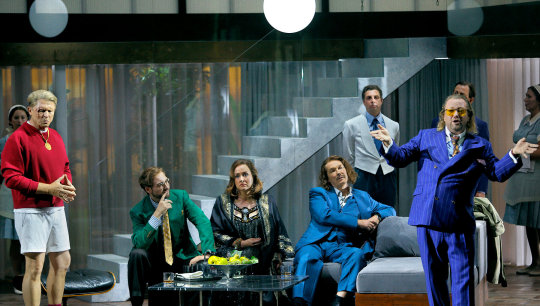
This Ring Cycle was being staged byValentin Schwarz, a 30 something Austrian opera director, and under the musical direction of Cornelius Meister. Schwarz was handpicked by Katharina Wagner. She’s the controversial director running the Bayreuth Festival - not because of talent (she has none) but by virtue of being Richard Wagner’s great-granddaughter (as well as Lizst’s great great granddaughter). In fact Schwarz’s production of the Ring Cycle was actually delayed from 2020 because of the Covid lockdown - so he had all these two years or so to fine tune it and get it right. He did neither and it was a like someone taping your eyelids back and strapping you down before forcing you for nights on end to watch a mind numbing TV soap opera on huge plasma screen.
I knew I was in trouble from the moment I opened the programme notes. My heart sank. Schwarz wasn’t looking to make a coherent Ring Cycle with Wagner’s libretto in a traditional sense, and is instead intended to be “constructively disrespectful”. Such a concept, which includes a deliberately “liberal approach to the plot”, and shifting representations of objects and ideas over the four evenings, is justified by alleged inherent inconsistencies within the work itself.
Oh. Dear God. No.
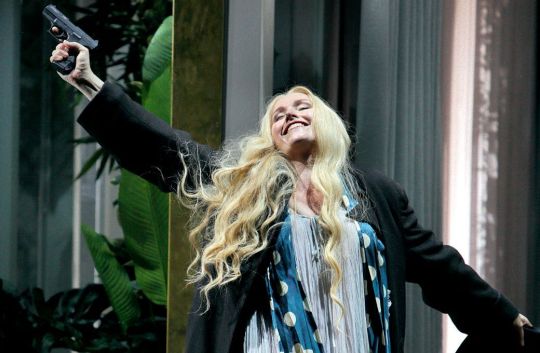
So this chap’s artistic approach was to go for ‘coherent incoherence’ to his overarching message. No, it doesn’t make sense to me either.
I know Wagner traditionalists, and I include myself, are always a hair trigger away from getting our knickers in a twist but when you’re putting on the complete Ring Cycle over four days then we can expect the bare minimum. So there has to be Ring because it’s called the Ring Cycle and preferably gold. And maybe throw in moving funeral march of Siegfried and a heart breaking farewell of Wotan to his daughter Brunnhilde. The bar is quite low. But no, we had none of this. Not even spears or swords and certainly no dragons (as Wagner had intended).
Wagner’s original conception embraces a three-fold division of the world: the Nibelungs beneath the world, the giants on the surface, and the gods in the cloudy heights; all this is made explicit in the third opera Siegfried. But what do we the audience get: a cheap and nasty prime time TV soap opera with studio sets to match. The paddling pool of Rheingold, where the Rhine maidens appear as nannies with children, had become a deep but empty swimming pool. There Hagen kills Siegfried, while his vassals lie half asleep in the fenced-off area above. Brünnhilde, who is supposed to be the tragic but awesome agent of destruction and rebirth, settled herself on the bottom of an empty and dirty swimming pool next to the dead body of her husband Siegfried with the remains of her mutilated horse in a plastic bag.
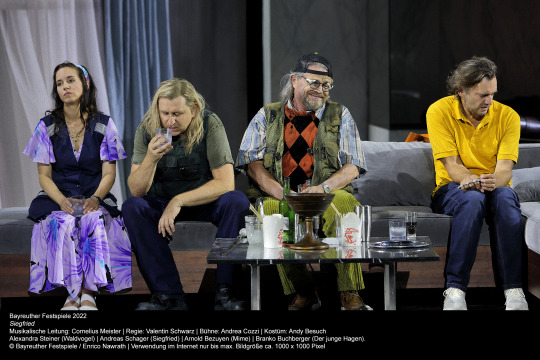
I tried to look past this travesty and honestly digged deep to make sense of what the production was trying to say. The whole staging and the costumes had a TV family soap opera flavour, that was blindingly obvious. But to what end? If there was an overarching theme then perhaps it was to focus on families and how wealth transforms and poisons future generations such as child abuse. The opening E flat chords of Das Rheingold played to a projection of twin foetuses in the womb. At first, they were intertwined peacefully, before one attacked the other, ripping the umbilical cord from its stomach. Moreover, through his programme notes, if not via actions on stage, Schwarz tells us that these warring foetuses are actually brothers of his own creation – Wotan and Alberich. What this sets up is an attempt to place the majority of the work’s characters into one of two branches of the same family – broadly, the have and have-nots – in order to compare their contrasting, or sometimes similar, fortunes, throughout the four evenings.
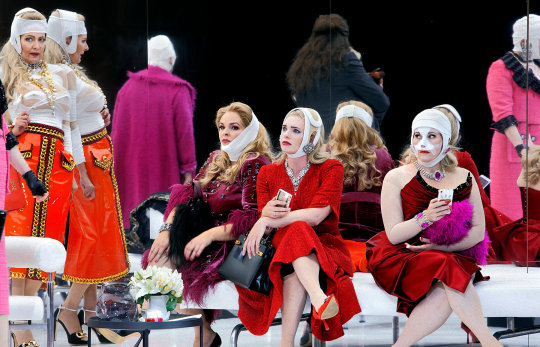
If that was the theme then I not convinced that it worked. Wotan at the start appears as a wheeler-dealer with a mobile phone, willing to be utterly ruthless, as when he shoots his own extra-marital son Siegmund in the second opera. This is Wagner’s Ring as dynastic soap opera but who cares? It’s not going anywhere. Schwarz’s idea, in Rheingold, that the cycle’s foundational sin was the seizure of a child, not of the gold from which a ring of power would be created, was not convincing. In Die Walküre, successfully subverting another big moment to the horror of traditionalists, he placed the final focus of the opera on Fricka’s futile triumph over Wotan, not on Wotan’s farewell to his daughter Brünnhilde. cycle ran out of steam in the end because it had no big or unifying idea.
New Ring cycles are springing up as the world’s opera houses get back into their rhythms after the pandemic. It is a competitive market. Among others, there was a well received one in Leipzig in June of this year, a promising one in Zürich, there’s another in Berlin this autumn and two in London in the years to come. Bayreuth remains an extraordinary venue, its ambitious ability to mount a new cycle in a single season is remarkable, and the 150th anniversary Ring, to be mounted there in 2026, will doubtless be a global event. But the festival feels as though it needs a radical rethink if it is to merit the reputation and attention.
My feeling, after mingling and chatting to others present to witness this travesty, is that many of the audience who were there this year may not have the patience to return for the revival of a Ring that went nowhere.
Increasingly I will tell anyone who wants to experience Wagner is to stay away from Bayreuth. Go and see a production anywhere else but Bayreuth that actually honours the spirit of Wagner’s artistic vision and above all respects the operatic lore and the source material.
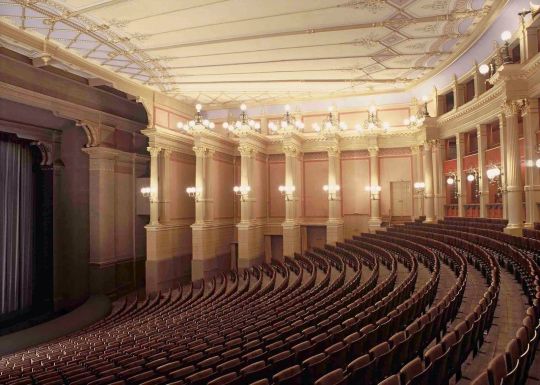
So let’s move on to more pleasant matters. Your question of Wagner and silence in operatic performances.
In effect you're asking about audiences at performances rather than the performers which I think is an interesting question!
Wagner the composer, not the man, was responsible for many things which I think he doesn’t get enough credit for. In effect he revolutionised the operatic stage. Of course one one of his reforms was to dispense with the term "opera," which he replaced with Music Drama. It was at his iconic Festival Playhouse in Bayreuth that he pioneered innovations which we all now take for granted as traditions. It was Wagner who first hid the orchestra in a sunken pit. It was Wagner who insisted on darkening the theatre. And it Wagner who did away with boxes (except for King Ludwig) and instead built in amphitheatrical seating with no aisles. All these innovations were designed as a way to focus all the attention to the stage. The atmosphere of ‘consecration’ striven for at Bayreuth - Parsifal, Wagner's last stage work, was called something like a "Stage-Consecrating Festival Play" (Bühnenweihfestspiel) - meant that talking, moving, etc. were strongly discouraged. Since all the seats were in long rows that spanned the entire auditorium with no aisles, it was basically impossible to leave your seat during an act without making a scandal.
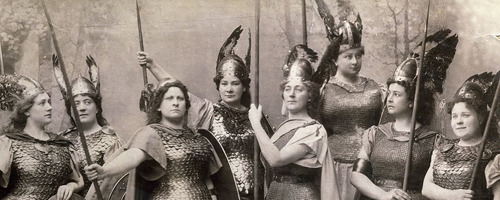
But did Wagner innovate the idea of silence of the audience before an operatic performance? Back in the day, Mark twain found himself writing a letter back home from Beyrouth where he had seen Tannhauser and suggesting the audience was quiet. He wrote, “I saw the last act of "Tannhäuser." I sat in the gloom and the deep stillness, waiting--one minute, two minutes, I do not know exactly how long - then the soft music of the hidden orchestra began to breathe its rich, long sighs out from under the distant stage, and by and by the drop-curtain parted in the middle and was drawn softly aside, disclosing the twilighted wood and a wayside shrine, with a white-robed girl praying and a man standing near. Presently that noble chorus of men's voices was heard approaching, and from that moment until the closing of the curtain it was music, just music--music to make one drunk with pleasure, music to make one take scrip and staff and beg his way round the globe to hear it.”
An audience at Bayreuth hasn’t always been known to be silent especially when they witness what they see as sacrilege on stage and they vent to make their feelings known with boos and cat calls. The story is similar in Milan at the equally famed La Scala too. In Italy to boo and catcall at the opera is positively a national past time. At La Scala opera singers were (and still are) at the mercy of a small group of Milanese musical purists - known as loggionisti, because of their fondness for the cheap seats (loggione) - if their performance was not up to scratch. It’s perfectly normal to interrupt the performance several times with noisy catcalls, and then round off the evening by booing loudly during the curtain call. How charming.
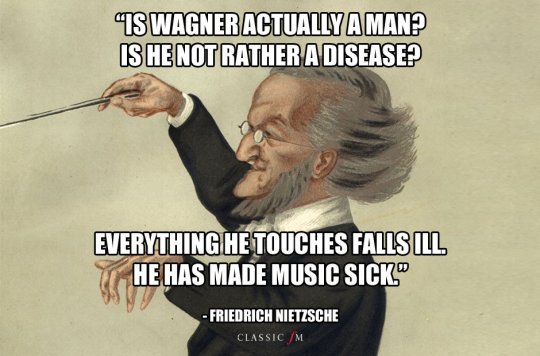
But did Wagner definitely usher in the silent audience for an operatic performance? It’s hard to say. We need to step back a little.
When the first public opera houses were founded in the mid-17th century, they were designed more as venues for social interaction than as sites of pure and sacrosanct aesthetic experience. Fanning out from the stage in glittering tiers were the boxes. Owned or leased by aristocrats or wealthy bourgeois, these intimate little spaces were perfect for entertaining guests, exchanging gossip or simply being seen. Down below was the parterre. Usually left open and generally without seating, this was the preserve of lower-income groups, including soldiers, students and servants, who used the space to meet friends, share a drink and gamble. Accordingly, the music was treated with noisy indifference, at best, or vocal contempt, at worst. Audiences were more interested in their own conversations than with what was happening on stage. They might perhaps listen to an aria, or watch the ballet (if there was one), but no more; and, if they did not like what they heard, they would make their displeasure known.
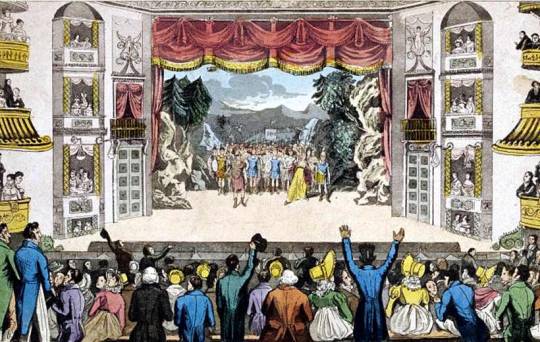
By the 18th century – when many theatres installed seats in the parterre and converted the top tiers of boxes into open loggione - the unruliness of performances had already become a commonplace of literature. In Les Liaisons dangereuses (1782), for example, Pierre Choderlos de Laclos indicated that well-bred patrons thought it quite acceptable to chat throughout a performance. In a letter to Sophie Carnay, Laclos’ ‘heroine’ Cécile de Volanges relates that she had been invited to the Marquise de Merteuil’s box at the Paris Opéra so that they could talk about her forthcoming marriage ‘without any fear of being overheard’. Naturally, such sociability all but smothered the music. After a visit to La Scala in 1770, the English music historian, Charles Burney, complained that the ‘abominable noise and inattention’ of his fellow patrons had made it impossible to make out anything but a few bars during some of the better known arias.
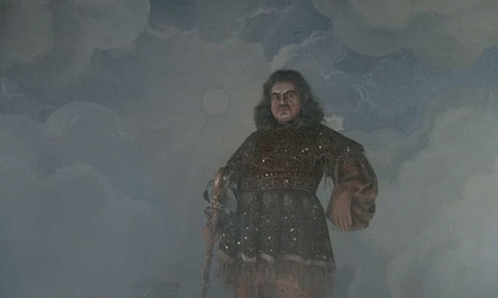
We can assume that British opera-goers were more reverent than their Italian counterparts. Samuel Sharp, a Brit visiting Naples in 1765, wrote in horror that at the San Carlo opera house “the crowd laughed and talked through the whole performance, without any restraint; and, it may be imagined, that an assembly of so many hundreds conversing together so loudly, must entirely cover the voices of the singers.” 85 years later, Mary Shelley expressed similar frustrations in Milan: “Unfortunately, as is well known, the theatre of La Scala serves, not only as the universal drawing-room for all the society of Milan, but every sort of trading transaction, from horse-dealing to stock-jobbing, is carried on in the pit; so that brief and far between are the snatches of melody one can catch.” In fact, for a while, La Scala was the only place the Milanese were allowed to gamble.
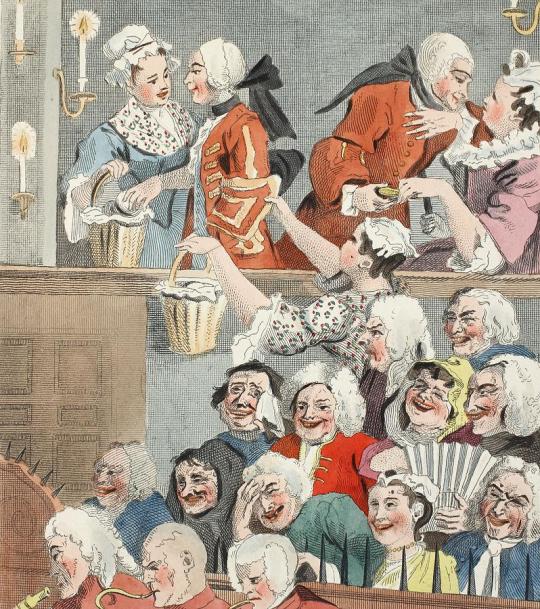
But this was entirely understandable. Imagine you’re an upper-class citizen in 18th or 19th-century Italy. You go to the opera regardless of what is playing, simply because that is where you will encounter the rest of society. You might attend in hopes of catching the eye of an attractive young lady or gentleman. Or maybe you want to talk politics - you can do that during the performance, too. Disappointed in a singer? Mention it to everyone else in your box. Hungry or thirsty? Flag down a seller of drinks or oranges. Buy and eat them - no need to wait for an intermission. Mid-eighteenth-century composers intentionally gave a less important singer the first aria in act two. This was known as the “sorbet aria”: it was traditional to serve sorbet at that time, and the clinking of the spoons made the music difficult to hear.) If the opera truly bores you, you can always pay a visit to friends in another box or head to the gambling tables.
Angered by the lack of respect for their music, some composers attempted to fight back – even writing works satirising their audiences’ bad manners. The anonymous Critique des Hamburgischen Schauplatzes (1725), for example, offered a comical defence of opera against the frequent interruptions of German loggionisti. But it was a losing battle. Realising that no audience would listen to an entire work, composers started to produce pieces that took account of their inattention. These often included an aria di sorbetto (‘sherbet aria’), an incidental passage that allowed the audience to buy food or drink without fear of missing anything important.
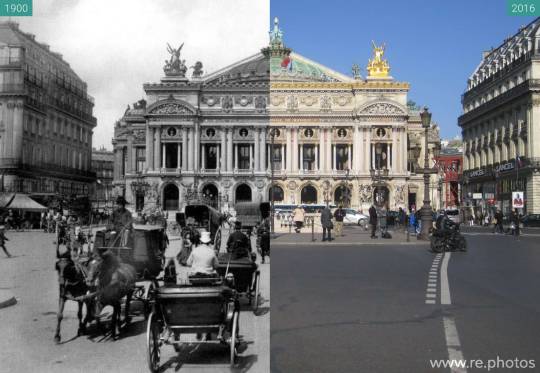
Such concessions only encouraged further raucousness. By the early 19th century, it was almost out of control. In Paris, the situation was particularly bad. In the 1830s, Honoré de Balzac admitted that no one went to the Opéra for the music; while in Stendhal’s Le rouge et le noir (1830) Julien Sorel quickly learns to disregard the performance in favour of his own intrigues. But in Milan, it was even worse. In 1840, Mary Shelley wrote: ‘The theatre of La Scala serves not only as the universal drawing-room for all the society of Milan, but every sort of trading transaction, from horse-dealing to stock-jobbing, is carried on in the pit; so that brief and far between are the snatches of melody that one can hear.’
This kind of control the audience had even influenced what performance happened onstage as well. We still see the occasional encore of a famous aria by a star singer, but in past centuries the audience could and did demand multiple encores of many pieces (little wonder, given how difficult it must have been to hear them the first time around!). In Vienna in 1786, Le nozze di Figaro was received five encores its first night and seven its second (prompting an emperor-imposed ban on encores at future performances, to keep the opera to a reasonable length). Verdi’s Otello had a particularly successful premiere in Milan, with even interludes encored and 20 curtain calls!

Not until the late 19th century did the composers and music directors gain the upper hand and in turn imposed silence as the norm for watching audiences. Even then, it took longer to reach some countries than others. An amusing illustration of the difference between Britain and Italy can be found in E.M. Forster’s novel Where Angels Fear to Tread (1905). Hoping to talk their widowed sister-in-law out of marrying an Italian, the interfering siblings, Philip and Harriet Kingcroft, rush off to the Tuscan town of Monteriano. Soon after arriving, Philip spots a poster announcing a performance of Donizetti’s Lucia di Lammermoor and tries to persuade the sceptical Harriet to go with him. ‘However bad the performance is to-night’, he warns, ‘it will be alive. Italians don’t love music silently, like the beastly Germans. The audience takes its share – sometimes more.’ And so it turns out. Though Harriet does not care for music, Forster noted, she knows ‘how to listen to it’, and is outraged by the constant shouting and whistling. Not until the mid-20th century would poor Harriet have been able to find an Italian theatre where silence more or less reigned.
Why did audiences change their minds? Part of the reason is undoubtedly the evolution of opera itself. Although composers had previously been willing to accommodate unruly behaviour, the advent of Romanticism persuaded Germans to adopt a more uncompromising approach in their music. Beginning with Louis Spohr – who abhorred the ‘vile noise’ of Italian opera houses – attempts were made to make opera more like the Singspiele (‘sing-plays’) of folk tradition. This entailed grouping arias into longer and more coherent scenes, which could not be interrupted or missed without the narrative thread being lost. The culmination of this trend was Richard Wagner’s notion of the Gesamtkunstwerk (‘total work of art’).
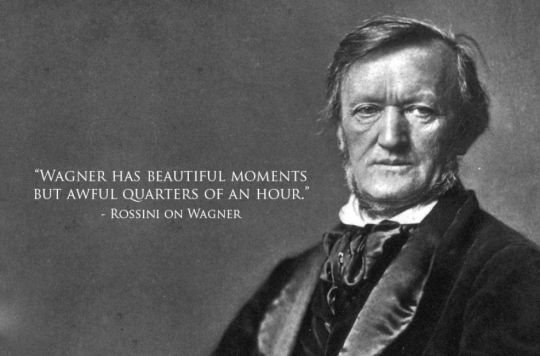
And now we come to Richard Wagner.
Most people blame Wagner for turning on the sound of silence. Because he was in total control at Bayreuth, he went ahead and eliminated audience boxes, hid the orchestral pit, and plunged the audience into darkness. The message was clear: look at the stage, not each other. Pay attention to the music and the action. Let the artists control your experience.
Wagner though didn’t just control his environment that his art demanded (or enforced) but he made demands on the audience for his music in the name of art. Combining music, poetry and drama in epic form, Wagner greatly expanded the role of the orchestra and relied more on the use of leitmotifs - recurrent musical themes associated with a particular character or idea - much beloved of movie soundtracks today, just listen to any John Williams composed films or Howard Shore’s Lord of the Rings - than on structural divisions to advance the story. So great were the demands placed on audiences, that little scope remained for inattention – or interjection. And, as Wagner’s influence spread, so did the silence.
Of course that silence by the audience during performances was also due to social changes and who went to the opera and it’s important to note that. Between about 1650 and 1850, opera was ‘enjoyed’ by a relatively broad range of people. Though public opera houses tended to be financed by monarchs, nobles or wealthy merchants, performances were attended by high and low alike. In the later 19th century, however, the emergence of music halls changed everything. Offering every kind of entertainment - from music to magic - and a deliberately relaxed atmosphere, these quickly won the favour of the working classes and those who didn’t have spare cash to burn. And so opera houses became the preserve of the upper and middle classes.
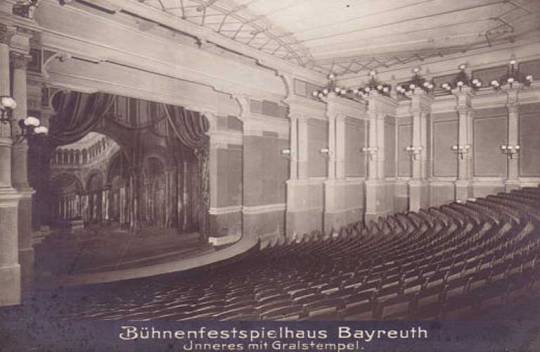
And what happens when the bourgeois and the middle classes capture an art form as an exclusive preserve of their class entitlement? They become snobby about it. They had to socially distance themselves from the great hoi polloi and the crude ways of the working poor. And what better way to virtue signal your civilised class refinement that than to socially enforce a reverential code of sacrilegious silence when watching an opera performance on stage?
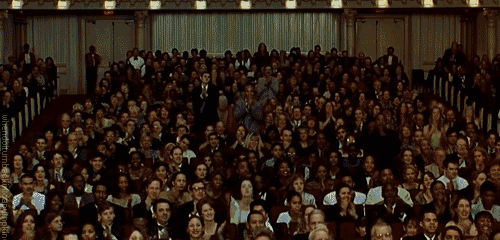
Indeed it’s ironic that Wagner himself who did much to usher in the silence was a victim himself. At Bayreuth performances audiences do not applaud at the end of the first act. This tradition is the result of a misunderstanding arising from Wagner's desire at the premiere to maintain the serious mood of the opera. After much applause following the first and second acts, Wagner spoke to the audience and said that the cast would take no curtain calls until the end of the performance. This confused the audience, who remained silent at the end of the opera until Wagner addressed them again, saying that he did not mean that they could not applaud.
After the performance Wagner complained, "Now I don't know. Did the audience like it or not?"At subsequent performances some believed that Wagner had wanted no applause until the very end, and there was silence after the first two acts. Eventually it became a Bayreuth tradition that no applause would be heard after the first act, but this was certainly not Wagner's idea. In fact, during the first Bayreuth performances, Wagner himself cried "Bravo!" as the Flower maidens made their exit in the second act. But on this occasion when he did this he was severely hissed by some of the audience watching. Wagner was scolded in his own theatre for being a rabble rousing lout. Charming.

All this is to say that this has rather uncomfortable implications. In preferring to listen to an opera in silence, are we really just perpetuating a form of Victorian snobbery? I will leave that for you to think further on.
I confess that I grew up in the Wagnerian tradition, like most opera fans, of respecting an operatic performance as it was happening with silence (even if I wanted to scream abuse at someone on stage as if I was at a football match). I’m no different from anyone else if some idiot is coughing loudly and I give him a look of silent despair or if some poor dear starts chatting to her neighbour then I just get mildly annoyed. I’m there for the opera to lift me out of my body and immerse me into the full drama and music. But even I can understand that such an imposed passivity might make opera inaccessible to everyone (or at least the ones it used to appeal to in the early days). Operas are long - especially Wagner’s operas - and it’s a rare person who can sit through an entire performance hanging on every note with almost religious devotion.

Perhaps the time is long overdue when we need to be so precious with such conventions, if only to broaden the appeal of opera. I’ve been fortunate to have seen operas all across Europe and few exceptional venues overseas too such as the Met in New York. These days if I go to the opera it’s to the Palais Garnier here in Paris. Surprisingly it’s not a stuffy affair as people come dressed as they please and the prices are more affordable, more so than in London. Change in the opera house culture comes at a glacial pace of turning a tanker around, but I feel they are heading in the right direction with their outreach work to appeal to a broader audience.
I’m all for innovation in that regard. Pop up performances in cafés or art galleries or other cool public venues may help people take a second look at opera again…and wrest control away from the stifling hold of the bourgeois. It’s not pure opera but hopefully it helps young people especially to embark on a journey to the opera house.
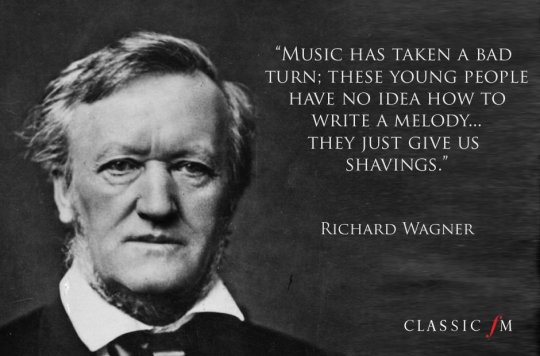
I hope we can have it both ways. I want to hear the music, and I also want the opera house to be a gathering place for all of society and a true diversity of people. I can’t imagine how one does that. Perhaps longer intermissions for food and drink? A beer tent with premium German beer? Or maybe a quiet gambling den area in the lobby area? And perhaps a brothel sponsored bonking boxes for…well, I’ll let your imagination run riot. And it would be keeping with tradition too.
The foyer de la danse in an opera house was a backstage room that essentially served as a brothel for opera and ballet patrons and aficionados in the 19th Century. While other international ballets and operas at the time had similar practices, the 19th century Paris Opera Ballet at the Palais Garnier was perhaps the most notorious and most celebrated by Parisians - how else do you suppose Edgar Degas hang out drawing sketches of nubile ballerinas. The opera house managers were positively pimping out the ballerinas and other artistic performers to keep the wealthy patrons sweet. Not that I’m condoning the legitimacy of courtesans flogging their wares during a performance of La Traviata, although Giuseppe Verdi might smile at the irony given that his celebrated opera was essentially about a Parisienne courtesan, Violetta Valery.
I’m sure the surly and serious minded Richard Wagner would get his mutton chop whiskers in a twist.

Thanks for your question.
#ask#question#music#opera#richard wagner#composer#wagner#ring cycle#bayreuth festival#bayreuth#german#germany#singing#music drama#paris#palais garnier#audience#history#music history#performance#mahler#verdi#concert#arts#culture#personal
33 notes
·
View notes
Photo









Das Lied von der Erde von Gustav Mahler &
Die Bienenkönige von Elfriede Jelinek
Staatsoper Stuttgart, Oktober 2020
Regie: David Hermann, Musikalische Leitung: Cornelius Meister, Bühne & Licht: Jo Schramm, Kostüme: Claudia Irro & Bettina Werner, Dramaturgie: Ingo Gerlach, Mitarbeit Regie: Anna Weber
mit: Katja Bürkle, Simone Schneider, Evelyn Herlitzius, Thomas Blondelle, Martin Gantner
Fotos: © Matthias Baus
3 notes
·
View notes
Text
Staatsoper Stuttgart - Casanova
Foto ©Matthias Baus Als letzte Neuproduktion im Jahr 2024 präsentierte die Staatsoper Stuttgart Casanova, eine Revueoperette, Continue reading Staatsoper Stuttgart – Casanova

View On WordPress
#canto#casanova#cornelius meister#critica#elmar gilbertsson#esther dierkes#johann strauss#johannes kammler#kai kluge#marco storman#maria guseynova#maria theresa ullrich#michael mayes#moritz kallenberg#novecento#opera#ralph benatzky#staatsoper stuttgart#staatsorchester stuttgart#stine marie fischer#stuttgart#teatro
0 notes
Text
BAYREUTH 2023: DER RING DES NIBELUNGEN
Pietari Inkinen Sense “la tortura” del visionament de la producció de Valentin Schwarz, amb la direcció musical de Pietari Inkinen, que l’estiu passat va haver de renunciar a l’estrena de la nova producció va haver de ser substituït a darrera hora per Cornelius Meister i amb alguns canvis significatius en rols fonamentals en cadascun dels quatre títols, he escoltat per ràdio aquesta tetralogia…
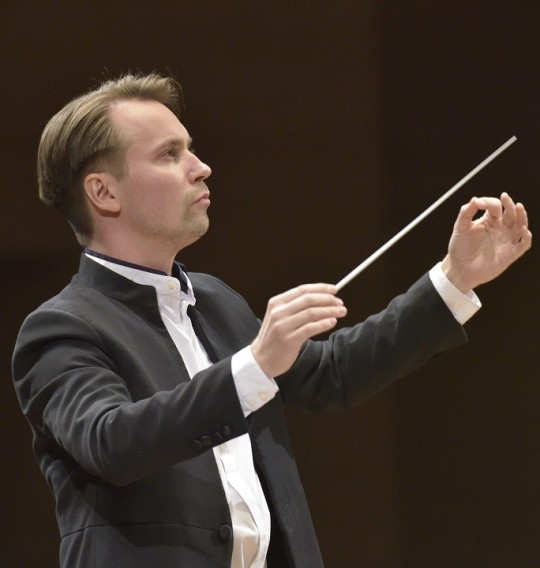
View On WordPress
#Aile Asszonyi#Alexandra Steiner#Andreas Schager#Arnold Bezuyen#Attilio Glaser#Ólafur Sigurdarson#Bayreuther Festspielorchester und Festpielchor#Brit-Tone Müllertz#Catherine Foster#Christa Mayer#Claire Barnett-Jones#Daniel Kirch#Daniela Köhler#Das Rheingold#Der Ring des Nibelungen#Die Walküre#Elisabeth Teige#Evelin Novak#Georg Zeppenfeld#Hailey Clark#Jens-Erik Aasbø#Kelly God#Klaus Florian Vogt#Marie Henriette Reinhold#Michael Kupfer-Radecky#Mika Karès#Okka von der Damerau#Pietari Inkinen#Raimund Nolte#Richard Wagner
0 notes
Text
Die Fledermaus
Dopo l’impegno e la grandiosità che hanno segnato l’apertura di stagione dell’Andrea Chénier di Giordano, il Teatro alla Scala sceglie la leggerezza per il secondo atto della propria programmazione. Sotto la briosa direzione di Cornelius Meister e con la convincente regia di Cornelius Obonya, Die Fledermaus non mostra i segni dell’età e mantiene tutta la propria freschezza
(more…)
View On WordPress
#Alexander Scherpink#Carl Haffner#Carolyn Pienkos#Cornelius Meister#Cornelius Obonya#Daniela Fally#Doris Capitelli#Elena Maximova#Eva Mei#Friedrich Rom#Giorgio Berrugi#Heike Scheele#Heinz Spoerli#Johann Strauss#Kresimir Spicer#Markus Werba#Michael Kraus#Paolo Rossi#Peter Sonn#Richard Genée
0 notes
Text
Doktor Faust torna al Maggio con regia di Livermore
(ANSA) – FIRENZE, 03 FEB – Il Doktor Faust di Ferruccio Busoni è la seconda opera in programma al Festival di Carnevale del Maggio musicale fiorentino. Andrà in scena il 7 febbraio, in sala grande, con il maestro Cornelius Meister alla guida del Coro e dell’Orchestra del Maggio. La regia è firmata da Davide Livermore, mentre nel cast figurano Dietrich Henschel, Wilhelm Schwinghammer, Daniel…
View On WordPress
0 notes
Note
Rankin/Bass Stopmotion Specials?-Christmas Anon
OK HERE WE GO
Santa Claus is comin’ to town
i lOVE
the berger meister meister burger is my favorite character ever
a yO YO????
when chris grows up and is wearing that fucking 70′s vest thing dkgsfkjhg
jessica’s pointy titties are my gay awakening
iTS A DIFFICULT RESPONSIBLITIY DENENENENEN THAT YOU ACCEPT FROM THE NUMBER 1 LAW MAKER ME”
winter is my fav boi
also the berger meister’s right hand man is gay, end of story.
ok the whole psychedelic song sequence is wild
rating: 🎄🎄🎄🎄🎄🎄🎄🎄🎄🎄(10/5)
The little drummer boy
nightmare
what the fuck
why
rating: no comment
Rudolph
rudolph’s voice is bad
“sHE SAID IM CUUUUUTE”
hermie is a twink
yukon cornelius is a fearless god
*licks pick-axe* mmmmm nOTHIN
“no boDY wAntS a cHARLie iN the boX”
rating: 🎄🎄(2/5)
#christmas anon#rudolph the red nosed reindeer#Santa Claus Is Comin' to Town (1970)#little drummer boy#amloth reviews
2 notes
·
View notes
Photo

@belvederemuseum #graw GROW DER BAUM IN DER KUNST Unteres Belvedere 23. September 2022 bis 8. Jänner 2023 KÜNSTLER*INNEN (76) Eduard Ameseder Ferdinand Andri Joannis Avramidis Robert Bielik Klemens Brosch Josef Čapek Franz Anton Coufal Lucas Cranach Constantin Damianos Gunter Damisch Honoré Daumier Christian Eisenberger Daniel Fischer Padhi Frieberger Giovanni Giuliani Franz Graf Asta Gröting Katharina Grosse Nilbar Güres Hannes Haslecker Carry Hauser Wolfgang Hollegha Adolf Hölzel Michal Kern Anselm Kiefer Vera Klimentyeva Peter Kogler Johann Korec Johann Victor Krämer Otakar Kubín Max Kurzweil Marek Kvetan Maria Legat Andries Cornelius Lens Liza Lou René Magritte Ralo Mayer Edda Mally Karl Mediz Emilie Mediz-Pelikan László Mednyánszky Meister der Crispinuslegende Zuzana Mináčová Alois Mosbacher Hans Nagelmüller Otakar Nejedlý Donna Ong Emil Orlik Marek Ormandík Giuseppe Penone (hier: Unteres Belvedere Stadt der Frauen) https://www.instagram.com/p/Ciz1bnCM71i/?igshid=NGJjMDIxMWI=
0 notes
Text
BAYREUTH 15 DE AGOSTO DE 2022; COM GÖTTERDÄMMERUNG VALENTIM SCHWARZ CULMINOU A SUA OBRA DE DESTRUIÇÃO DA TETRALOGIA. VOZES E MÚSICA COM ALTOS E BAIXOS . MEDROSO O AUSTRÍACO NÃO SE APRESENTOU AO PÚBLICO …
Siegfried e Brunhilde estão de casa e pucarinho com a filha . Mas o “ herói “ vai a procura de mais . Nas novas paragens Gunther, o dono da casa, drogado , veste uma T-shirt com a inscrição "Who the fuck is Grane “. Aparece Siegfried que se apaixona por Gutrune sem ter de beber a poção do esquecimento para deixar Brünnhilde e sacrificá-la à perfídia do Gibichunge. Mas Grane não gosta do que vê e é torturado e decepado , mas nos bastidores, numa cena a que felizmente nos poupam . Siegfried e Gunther bebem o seu sangue para selar o pacto de traição de Brünnhilde. Tudo isto é patético – uma manta de incoerências cénicas do Sr. Valentin .Siegfried, em vez de ser o simplório de plantão, entrou no grupo dos vilões deste mundo. Hagen mata Siegfried numa piscina abandonada, depois de um curto treino de boxe com o pai Alberich .Só há uma imagem esteticamente forte — a dos homens de Hagen com máscaras na neblina escura,. O fim superou em muito as piores expectativas com uma cena final da Imolação de Brunnhilde sem imolação ou algo parecido; acontece no fundo da esquálida piscina com ela segurando a cabeça decepada de Crane e depois deitada ao lado do cadáver de Siegfried.. ( óbvias referências à Salomé de Castelucci no saco de boxe e na cabeça de Crane ….) No 'novo mundo' ficam , o filho agora inventado com Siegfried, o não assassinado Gunther, Hagen -que também não morre -, a tola Gutrune e a memória de uma tetralogia produto de um encenador incompetente e petulante que permanecerá como testemunho do “crepúsculo” artístico do Festival de Bayreuth e do meu adeus . O que Valentin Schwarz fez é Scheisse e foi cobardia não se apresentar ao público . Vocalmente Stephen Gould esteve em baixo de forma vocal .Para Iréne Theorin como Brünnhilde , as partes mais altas de seu papel são agora claramente um desafio para ela e o melhor que se pode dizer é que passou pela “cena de imolação” de maneira louvável . Repúdio os apupos do público ( sobretudo da claque inglesa) ao crepúsculo vocal da grande soprano. Gunther e Gutrune foram soberbamente caracterizados por Michael Kupfer-Radecky e Elisabeth Teige. Bem também Christa Mayer como Waltraute e Olafur Sigurdarson como Alberich .Bem os trios de Norns e Rhinemaidens. O melhor de todos foi Albert Dohmen numa impressionante prestação como Hagen. Cornelius Meister continuou a não conseguir extrair todos os recursos da poderosa Orquestra do Festival de Bayreuth para a execução desta música sublime .






0 notes